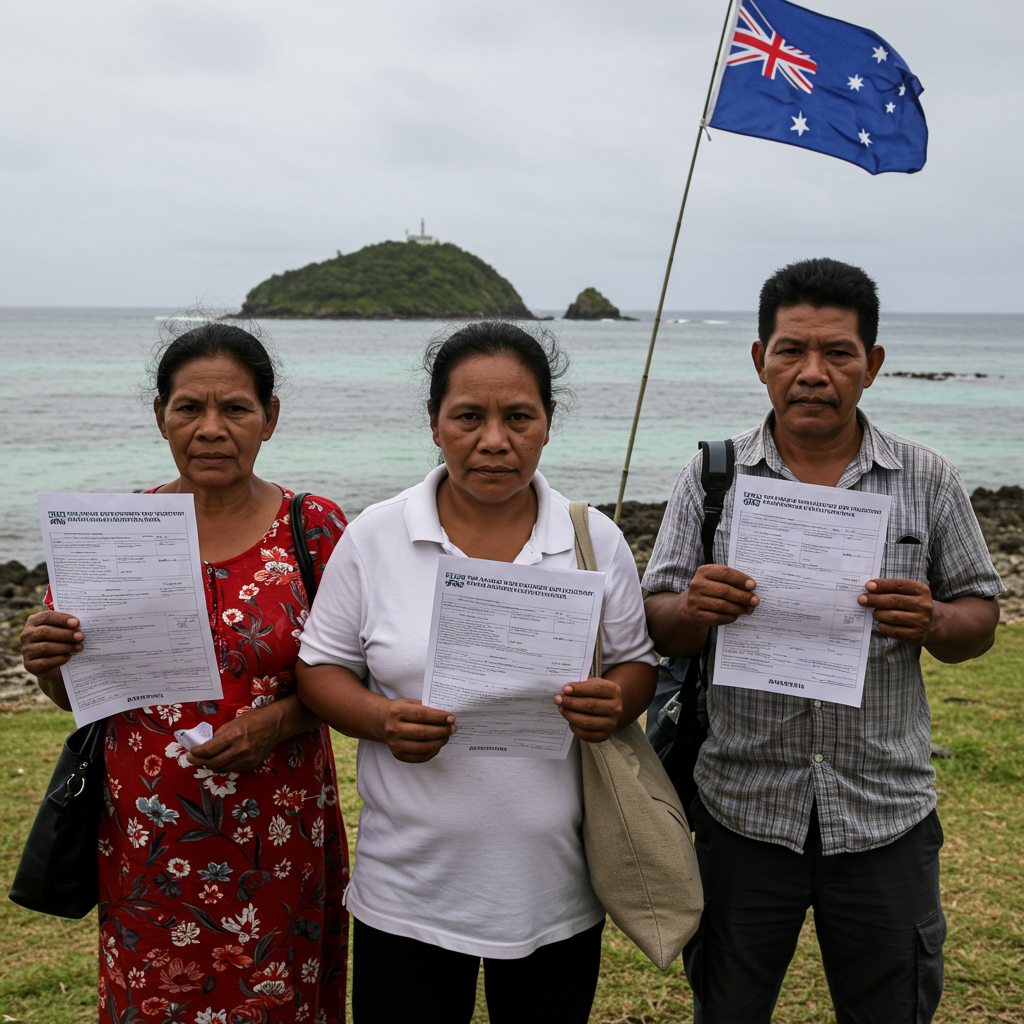The tiny island nation of tuvalu faces a monumental threat from rising sea levels driven by global warming. As its low-lying land disappears beneath encroaching waters, a unique lifeline has emerged: a special climate visa offered by australia. This groundbreaking program, part of a larger bilateral treaty, has seen an overwhelming response, with nearly half of Tuvalu’s citizens applying rapidly for a chance to relocate. This urgent migration highlights the severe, immediate impacts of climate change on vulnerable populations.
An Island Nation Under Threat
Tuvalu is one of the world’s smallest countries, comprising nine scattered coral atolls and sandbars. Its total land area spans less than 10 square miles, home to around 10,643 people as of the 2022 census. Crucially, no part of Tuvalu rises more than six meters above sea level. This extreme lack of elevation makes it terrifyingly vulnerable to even slight increases in ocean levels. Scientists warn that parts of Tuvalu could become uninhabitable within decades. Two of its nine atolls are already substantially lost to the waves.
Rising seas directly threaten life on the islands. Saltwater increasingly infiltrates the limited freshwater lens beneath the land, contaminating precious drinking water wells. Projections indicate that within a century, daily high tides could regularly inundate over 90% of Funafuti, the capital island where most Tuvaluans live. Funafuti is incredibly narrow in places, only about 65 feet (20 meters) wide, leaving inhabitants literally nowhere higher to go.
Australia’s Pioneering Climate Migration Pathway
In recognition of this existential crisis, Australia and Tuvalu signed a landmark agreement in 2023, known as the Falepili Union. This pact includes a unique provision: a special “climate mobility pathway” for Tuvaluan citizens seeking refuge from worsening climate impacts. Described by Australia as the “first agreement of its kind anywhere in the world,” it aims to provide a “pathway for mobility with dignity.”
Under this program, Australia will grant permanent residency visas to 280 Tuvaluans each year. Those accepted gain the right to live, work, and study in Australia, along with access to public healthcare and education services. This structured pathway offers a stark contrast to the often perilous and undignified circumstances faced by climate-displaced people globally.
Overwhelming Demand for the Visa
The response to the Falepili Mobility Pathway has been dramatic. The application period for the first intake opened on June 16. Within just four days, official figures showed that 3,125 Tuvaluans had entered the random ballot. With Tuvalu’s total population just over 10,000, this means nearly a third of the entire nation applied in the first few days alone. Other reports indicate that over 4,000 applications were received quickly, pushing the number towards nearly half the population.
This extraordinary level of interest vividly illustrates the depth of fear and uncertainty felt by Tuvaluans regarding their future on the islands. The ballot requires a modest registration fee of A$25 (about US$16) and is scheduled to close on July 18, suggesting application numbers could climb even higher. The program is massively oversubscribed for the initial 280 places, highlighting the urgent need for options as climate change accelerates.
Tuvalu’s Prime Minister, Feleti Teo, has underscored the severity of the situation. He notes that by 2050, over half of Tuvalu is projected to be regularly inundated by tidal surges. By 2100, this figure could rise to a staggering 90%. Such projections leave Tuvaluans with no illusion about the long-term habitability of their homeland.
The Falepili Union: Beyond Migration
The Falepili Union treaty is more comprehensive than just a climate visa program. It also includes significant security commitments. Australia has pledged to defend Tuvalu, upon request, against major natural disasters, health pandemics, and military aggression. Tuvalu’s Prime Minister has highlighted this as the first time any country has legally committed to coming to Tuvalu’s aid in these specific scenarios.
A unique and pivotal aspect of the treaty is Australia’s commitment to legally recognize Tuvalu’s statehood and sovereignty into the future, regardless of the impacts of sea-level rise on its physical territory. This clause is unprecedented internationally and signals a new approach to the complex issue of disappearing states.
Geopolitically, the treaty also serves Australia’s strategic interests in the Pacific. Australia views strong partnerships in the region as crucial, particularly in the context of countering China’s growing influence. The pact includes a clause granting Australia a say in any other defense agreements Tuvalu might pursue, an element that initially raised some concerns about Tuvaluan sovereignty. Tuvalu is one of only a few nations maintaining formal diplomatic relations with Taiwan, adding another layer to its geopolitical importance. This treaty reinforces Australia’s stated goal of being a trusted regional partner.
A Digital Nation’s Future?
Facing the potential loss of its physical land, Tuvalu announced an ambitious and innovative initiative in 2022: the intention to become the world’s first nation to exist entirely in the metaverse. This involves creating a complete digital recreation of its land and islands, archiving its history and culture, and moving all government functions into a digital space.
The Falepili Union explicitly recognizes Tuvalu’s “digital sovereignty,” supporting the nation’s efforts to retain its identity and function as a state even if its physical land is submerged. This forward-thinking approach demonstrates Tuvalu’s determination to preserve its heritage and continue existing as a nation against overwhelming environmental odds.
Potential Challenges: The Risk of Brain Drain
While the climate visa program offers a vital lifeline, it also raises concerns about potential negative consequences for Tuvalu itself. Experts fear a potential “brain drain,” where the most skilled, educated, and working-age individuals might disproportionately take advantage of the migration pathway.
Geographer John Connell notes that small island states like Tuvalu offer limited economic opportunities, particularly given their geography. A significant exodus of talent could further strain the nation’s capacity and resources, potentially imperiling its future viability on the islands for those who remain. Balancing the need to offer refuge with the challenge of preserving the community and capacity of the home nation remains a complex issue.
The Australian climate visa for Tuvalu is a significant, albeit small-scale, response to the stark reality of climate displacement. It sets a precedent for how nations might address climate-forced migration with dignity and structure. However, the overwhelming number of applications underscores the severity of the crisis facing Tuvalu and highlights the urgent need for global action to address the root causes of sea-level rise, rather than relying solely on migration as a solution. This unique pact, with its blend of migration pathways, security guarantees, recognition of digital statehood, and geopolitical layers, reflects the complex challenges facing vulnerable nations in a changing world.
Frequently Asked Questions
What is Australia’s Falepili Mobility Pathway for Tuvalu?
The Falepili Mobility Pathway is a special climate visa program created by Australia under the Falepili Union treaty with Tuvalu. It offers a pathway for adult citizens of Tuvalu to gain permanent residency in Australia due to the existential threat posed by rising sea levels and climate change in their home country. Annually, 280 Tuvaluans will be granted visas through a random ballot system.
How many Tuvalu citizens have applied for the new climate visa?
Within just the first few days of the application ballot opening in June 2025, over 3,000 Tuvaluans applied for the climate visa. Given Tuvalu’s total population is just over 10,000, this represents nearly one-third to almost half of the entire nation expressing interest in relocating, highlighting the scale of concern about climate impacts.
Could the climate visa cause ‘brain drain’ in Tuvalu?
Yes, analysts and experts have raised concerns about the potential for ‘brain drain’. The migration pathway, while offering refuge, could lead to a significant number of skilled, educated, and working-age Tuvaluans leaving the islands. This departure could strain Tuvalu’s limited resources and capacity, potentially making it more challenging for the nation to function and adapt to climate impacts for those who choose or need to remain.
Word Count Check: 1050




